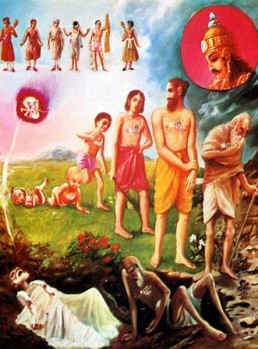Swami Chinmayananda
Swami Chinmayananda Commentary
Work done with a mind undisturbed by anxieties for the results is indeed superior to the work done by a dissipasted mind, ever worrying over the results. Here the term, “Buddhi yoga” has tickled some commentators to discover in it a special Yoga advised by the Geeta. I personally think that it is too much of a laboured theory. Buddhi as defined in the Upanishads, is the determining factor in the “inner-equipment”; Nishchyatmika is ‘intellect’; Samshayatmika is ‘mind’. Thus, when the thoughtflow is in a state of flux and agitated, it is called the ‘mind’; and when it is single-pointed, calm and serene in its own determination, it is called the ‘intellect.’ Thus, Buddhi yoga means “to be established in the devotion to the intellect.” Steady in your conviction, your mind perfectly under the control of your discriminative intellect, to live thus as a master of your inner and outer world is called Buddhi yoga. In Buddhi yoga we pursue our duties in life, without ever losing sight of our ultimate Goal in Life.
Analysing the meaning of the stanza in terms of what we have already seen regarding the split-personality and its cure through Vasana-purgation, we may interpret Buddhi yoga as an individual’s attempt to live and act from the zone of the intellect which freely controls the mind’s functions, and readily receives faithful obedience from the mind. The attempt of the mind to work in union with the intellect — the “objective-mind” working under the control and the order of the “subjective-mind” — is called Buddhi yoga. By so doing, instead of incurring more and more liabilities of new Vasana-bondages, the individual gains a release from the mental congestion created by the existing Vasanas. Thus, when an individual completely surrenders his ego, he is said to be “Established in Buddhi yoga.” Hence it is said “SEEK REFUGE IN Buddhi,” meaning: “let your mind be perfectly under the control and direction of the intellect.”
There is a solid reason why we should live under the control of the intellect. Those who live in the mental zone, tossed about by the mind’s tribulations, get agitated by anxiety for the fruits-of-actions. Such people are termed here as ‘wretched. ‘ It is a powerful statement by which Vyasa condemns such thoughtless, unintelligent people: “WRETCHED ARE THEY WHO ACT FOR THE RESULTS.” Understood properly, this is a wonderful guidance by following which we can totally eliminate all failures in life. Efficient activity in the present alone can order great results.
They are “wretched” because they will be, in their desire-prompted activities, incurring new Vasanas and thus will be thickening the veil of ignorance of their own glorious Divinity. Unselfish work, performed in a spirit of dedication and ego-less surrender, is the secret method of exhausting our Vasana-store. Such a mind alone, purged clean, can reflect the Self clearly and come to discover the Eternal God-hood.
NOW, LEARN WHAT RESULTS HE GAINS WHO PERFORMS HIS DUTY WITH EVENNESS-OF-MIND:
Adi Sankara Commentary
Then again, O Dhananjaya, as against action performed with equanimity of mind for adoring God, karma, action undertaken by one longing for the results; is, hi, indeed; durena, quite, by far; avaram, inferior, very remote; buddhi-yogat, from the yoga of wisdom, from actions undertaken with equanimity of mind, because it (the former) is the cause of birth, death, etc. Since this is so, therefore, saranam anviccha, take resort to, seek shelter; buddhau, under wisdom, which relates to Yoga, or to the Conviction about Reality that arises from its (the former’s) maturity and which is the cause of (achieving) fearlessness. The meaning is that you should resort to the knowledge of the supreme Goal, because those who under take inferior actions, phala-hetavah, who thirst for rewards, who are impelled by results; are krpanah, pitiable, according to the Sruti, ‘He, O Gargi, who departs from this world without knowing this Immutable, is pitiable’ (Br. 3.8.10). [See note under 2.7.-Tr.]
The Bhagavad Gita with the commentary of Sri Sankaracharya – Translated by Alladi Mahadeva Sastry
Holy Geeta – Commentary by Swami Chinmayananda
The Bhagavad Gita by Eknath Easwaran – Best selling translation of the Bhagavad Gita
The Bhagavad Gita – Translation and Commentary by Swami Sivananda
Bhagavad Gita – Translation and Commentary by Bhaktivedanta Swami Prabupadha
Srimad Bhagavad Gita Chapter 2 – Verse 49 – 2.49 durena hy-avaram – All Bhagavad Gita (Geeta) Verses in Sanskrit, English, Transliteration, Word Meaning, Translation, Audio, Shankara Bhashya, Adi Sankaracharya Commentary and Links to Videos by Swami Chinmayananda and others – 2-49

